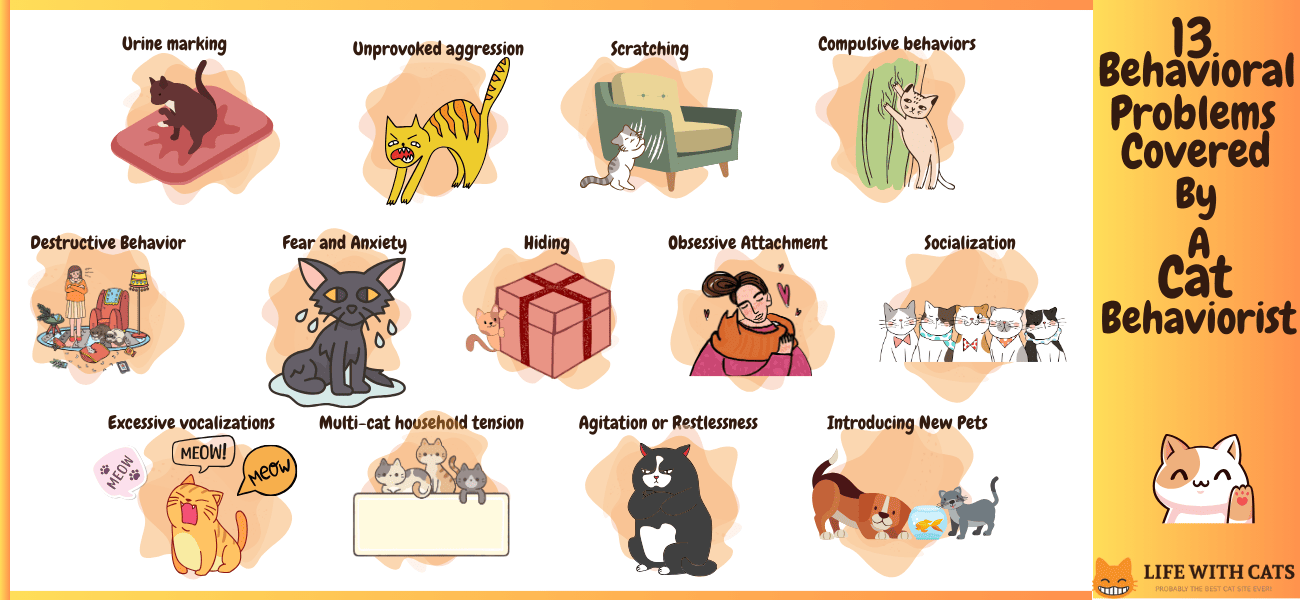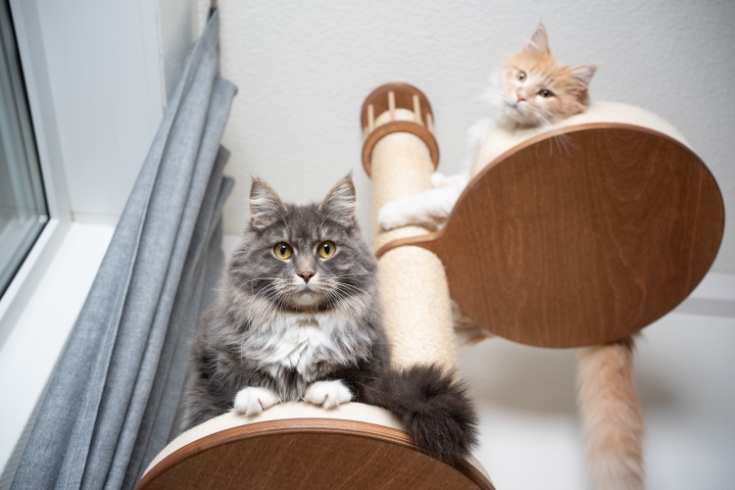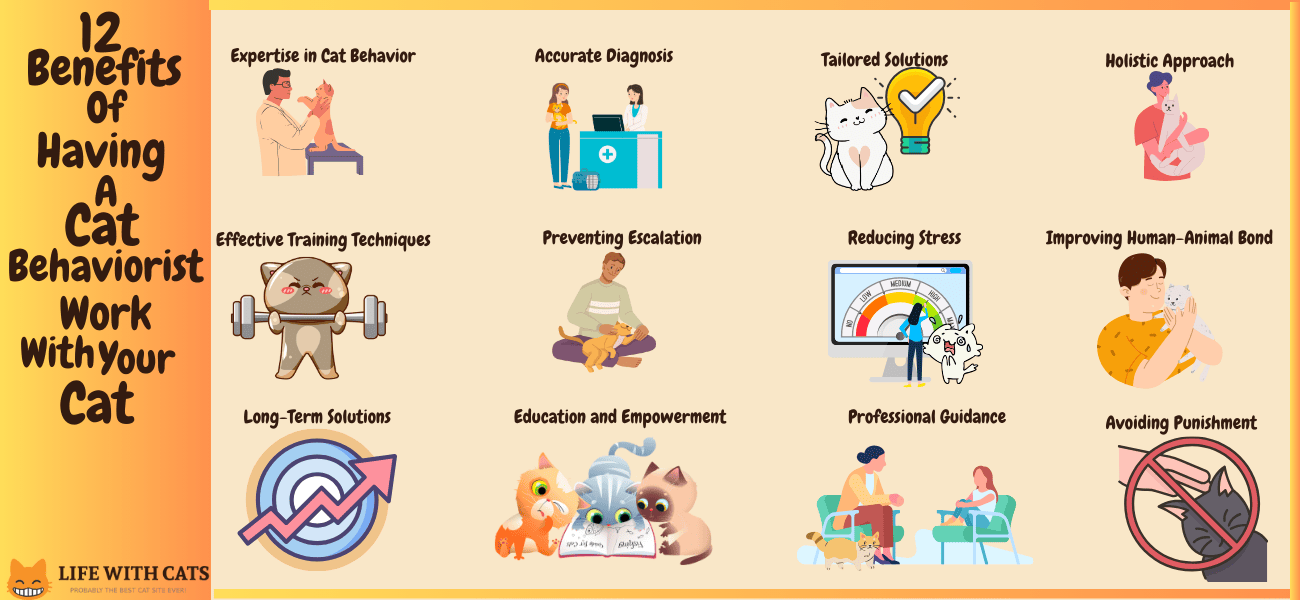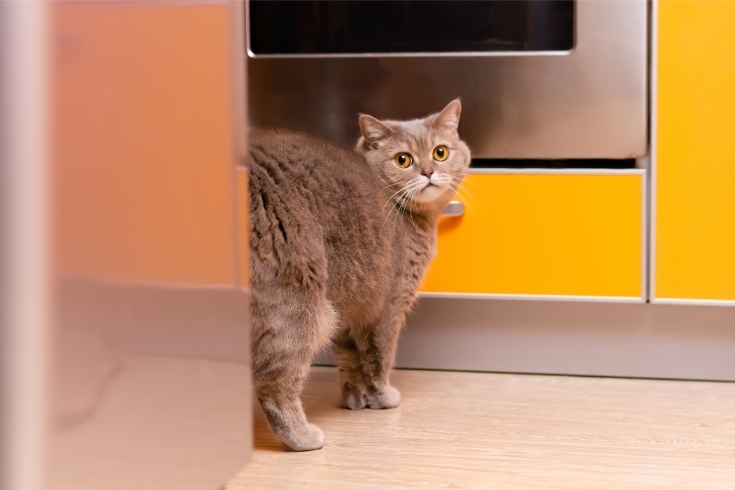A top cat behaviorist is a specialist with in-depth knowledge and expertise in feline behavior and psychology.
Cat behaviorists can help cat owners fix problem behaviors in their cats, such as aggression, anxiety, fear, and destructive behavior. A cat behaviorist works closely with the cat and its owner to work out the root cause of the problem and put in place a training plan to correct and modify it. Cat behaviorists typically have extensive experience working with cats and have received specialized training and certification in the field of animal behavior, as well as a degree-level education.
A cat trainer, in comparison, works with cat owners to show them how to teach their cats basic commands, tricks, and routines. Some cat trainers work with theater productions or filmmakers where cats are needed to perform a specific trick or make an appearance in a particular movie scene.
In this guide, we introduce 11 of the top cat behaviorists nationwide, discuss what behavioral problems they can help correct, and look at how you can become one. A cat behaviorist can help you diagnose, treat, and modify your cat’s undesirable behaviors, improving the cat-human bond and making your home a more harmonious place to be.
So, if your cat has issues, you must read this guide to learn how one of our top cat behaviorists could help you and your pet!
Who Are The Top Cat Behaviorists?
Top cat behaviorists are absolutely critical if your kitty has issues that need addressing. Sometimes, you can feel alone, frustrated, and stressed if your cat doesn’t behave well, and one of these guys could help return harmony to your home.
Pam Johnson-Bennett
Often considered the founder of cat behavior consulting, Pam is an author of multiple books and a regular presence on TV and radio.
Website: https://www.catbehaviorassociates.com/
To book a consultation and find out about fees, contact Pam through the form on her website.
“Think Like A Cat” is one of Pam’s most popular books.
Jackson Galaxy
Known for his TV show “My Cat from Hell,” Jackson Galaxy has become a household name in the world of cat behavior.
Website: https://www.jacksongalaxy.com/
Check out the website to book a consultation and find out what fees he charges.
“Catify to Satisfy” is one of Jackson’s most popular books.
Mieshelle Nagelschneider
Known as the “Cat Whisperer,” Mieshelle has a wide reach through her consulting, media appearances, and books.
Website: https://www.thecatbehaviorclinic.com/
Telephone: 503-267-8888
To book a consultation and get a quote for her fees, complete the form on Mieschelle’s website.
“The Cat Whisperer” is one of Mieshelle’s most popular books and is available for you to buy on Amazon.
Ingrid Johnson
Ingrid is best known for her emphasis on creating feline-friendly environments, utilizing toys, and understanding the natural behavior of cats.
Website: http://www.fundamentallyfeline.com/
Email: [email protected]
Ingrid prefers it if you complete the form on her website to contact her and ask any questions you have.
We looked for books written by Ingrid, but it looks like most of her content is published on the website and blog.
Anita Kelsey
Anita is a cat behaviorist and a qualified groomer based in London, UK, where she runs a cat behavioral service for the Home Counties.
Website: http://www.catbehaviourist.com/
Email: [email protected]
Telephone: 07956 640 194
Anita’s latest book, “Let’s Talk About Cats, ” is available from Amazon.
Jane Ehrlich
Jane has a long history of working with cats, having experience in various roles, including at the RSPCA.
Website: https://www.cattitudebehavior.com/
Location: Arizona
Telephone: 602 410 9236
Email: Jane_ehr@ hotmail.com
Jane doesn’t currently have a book published, but you can find plenty of helpful pro tips in her blog on the website.
Marilyn Krieger
Known as “The Cat Coach,” Marilyn offers personalized consultations and has written for many publications.
Website: https://www.thecatcoach.com/
Telephone: (650) 780-9485
Contact Marilyn by using the form on her website to book a consultation. Rates are as shown below:
- On-site: $445 (plus travel)
- Remote: $340
- Day rate: $1500 (plus travel & lodging expenses)
Marilyn’s latest book is called “Naughty No More” and can be found on Amazon.
Dr. Mikel Maria Delgado
A certified applied animal behaviorist, Mikel Maria Delgado has extensive research and academic background in animal behavior.
Website: https://mikeldelgado.com/
You can contact Dr. Delgado through the form on her website. Most of her published work is for magazines and other publications; you can find details on her website and plenty of helpful blog posts.
Lisa Stemcosky
Lisa is the Feline Behavior Manager at Humane Rescue Alliance, where she works to improve the lives of cats by offering behavior and training support and educating the community.
Website: https://www.pawliticallycorrect.com/
Contact Lisa using the form on her website to learn about her consultation rates and procedures and to read helpful blog posts.
Dr. Marci Koski
Dr. Marci is a certified feline behavior and training consultant. She has a passion for improving the cat-human relationship.
Website: https://felinebehaviorsolutions.com/
Telephone: 503 927 1107
Fees: Consultation fees range from $175 to $550, depending on what service you require
Dr. Marci has plenty of published posts on her website to browse through and podcasts to enjoy. At the moment, she doesn’t have any books as far as we can see.
Rita Reimers
Rita has multiple decades of experience in working with cats and has established herself as a trusted voice in the field.
Website: https://catbehavioralliance.com/
You can contact Rita through her website to book a consultation and find out more about her fees.
Rita’s popular book “Sadie’s Heart – Loving and Losing Our Cat Companions” is available from Amazon.
What Is A Cat Behaviorist
Cat behaviorists are experts in feline behavior and psychology and specialize in diagnosing and treating behavioral issues in cats, such as aggression, anxiety, fear, and destructive behavior. These professionals work closely with cat owners to develop a customized training plan to modify and correct those undesirable behaviors, drawing on their extensive experience working with cats and specialized training and certification in animal behavior.
Ultimately, the aim of a cat behaviorist is to strengthen the bond between cats and their owners and create a more peaceful home environment.
What Is The Difference Between A Cat Behaviorist And A Cat Trainer?
Think of a cat behaviorist as a therapist for cats. Behaviorists try to get into the kitty’s head to figure out why they’re acting a certain way, for example, why the cat might be hissing at your new kitten or avoiding using her litter box.
In contrast, a cat trainer is more like a coach, teaching cats cool tricks or handy habits using treats and praise, like getting them to come when you call or to chill out and not jump on the dinner table.
Both are professionals whose role is all about helping cats, but a behaviorist dives deep into the cat’s feelings, while the cat trainer is more about teaching your feline friend fun or useful moves.
What Are The Behavioral Problems Covered By A Cat Behaviorist?

Problems covered by a cat behaviorist are those that affect you and your cat’s quality of life. For example, unprovoked aggression, scratching your furniture, fear and anxiety, and problems when introducing new pets.
Here’s an overview of the kind of behavioral problems a cat behaviorist can help you solve.
Urine Marking
Cats are territorial animals, and one of the ways they mark their territory is by spraying or using urine to mark their patch. Unfortunately, cat urine is incredibly difficult to get rid of, and the cat will often return to its chosen marking spot to repeat the deed.
Urine marking is often triggered by changes in the cat’s environment, such as house moves or the introduction of a new pet or baby. Stress and fear can also cause this undesirable behavior, and medical issues could also be to blame.
Unprovoked Aggression
Unprovoked aggression can be a big problem, especially if you have other pets or young children in your household. Aggression can be triggered by health conditions that make it uncomfortable or painful for the cat to be touched or could be in response to a perceived threat.
Scratching
Scratching is a perfectly natural activity that cats do to keep their claws in good condition and to mark their territory. Cats that live outside tend to scratch at certain strategic points around your backyard or garden, telling strangers that they are around.
However, scratching can be a big problem if you have a house cat that refuses to use a scratching post, preferring to leave her mark on your very expensive leather sofa!
Compulsive Behaviors
Compulsive behaviors in cats are generally caused by conflict and can include:
- Excessive chewing and sucking
- Hunting and pouncing on imaginary prey
- Chasing and running for no reason
- Paw shaking
- Freezing
- Excessive vocalization
- Tail chasing or self-directed aggression
- Overgrooming
- Feline hyperesthesia
Many of these habits can harm the cat’s health and well-being, so it’s important to correct them.
Excessive Vocalizations
Some cats become extremely vocal when stressed or anxious, which can be a nightmare for you and your neighbors, especially if you live in an apartment. However, excessive vocalizations can be caused by health conditions, such as feline cognitive dysfunction, most often, your cat meows or even yowls for some environmental reason.
Multi-Cat Household Tension
Cats in a multi-cat household often disagree and squabble over territory and food, creating a lot of tension and sometimes even leading to fights.
Fear And Anxiety
Many undesirable cat behaviors are triggered by fear and anxiety, and there are lots of causes for that. Your first task as a responsible cat owner is to work out what makes your cat afraid or anxious and then ask the behaviorist for a practical plan of action to help your cat.
Agitation Or Restlessness
An agitated or restless cat will never have a good quality of life and can be incredibly disruptive in your household. A cat behaviorist will work out why your cat is so unsettled and explain what you can do to remedy that.
Introducing New Pets

Introducing new pets to an established household with a cat can cause tremendous stress and upset both the newcomer and the resident. Generally, all the animals will get used to each other and settle down, but in some cases, you will need the help of a cat behaviorist, especially when aggression is a problem.
Socialization
Many cats adopted from shelters have never been properly socialized and could have lived their whole lives on the streets. That can cause problems, especially in a multi-cat household, and a cat behaviorist professional will be able to advise you on how to socialize your new pet safely and with minimal stress to all concerned.
Destructive Behavior
Indoor cats can become quite destructive, chewing things and scratching their clothes on furniture and floor coverings. The cause of these problems is generally boredom and frustration, which can be helped by providing your cat with plenty of toys and training her to modify those destructive behaviors.
Hiding
A stressed and frightened cat often hides somewhere dark and confined where she feels safe. That is often the case when fireworks are being set off outside and during thunderstorms, but the behavior can also be triggered when a cat is very stressed and feeling insecure or threatened.
For example, when I moved home, one of my cats would not come out from behind the sofa for the first week we lived there. Thankfully, once she realized that this was to be her new home, she emerged. I think her braver brother had told her about the good food and fuss that she was missing out on!
Obsessive Attachment

Although not as common in cats as in dogs, some furry friends become obsessively attached to their owners, getting incredibly stressed and even distraught when separated for a very short while.
A cat behaviorist can help to modify this obsessive behavior through positive reinforcement training and therapy.
What Are The Benefits Of Having A Cat Behaviorist Work With Your Cat?

The benefits of using a cat behaviorist are many for both you and your cat, and they are usually well worth the behaviorist’s fee. If you’re counting your pennies, it’s worth noting that many behaviorists provide online service via Zoom calls, which is much cheaper than a one-to-one therapy session but every bit as helpful.
Here’s what benefits you can expect when using a cat behaviorist.
Expertise In Cat Behavior
Most behaviorists have many years of experience in cat behavior and are extremely well-qualified in their field. In fact, you can bet that a professional will have seen whatever undesirable behaviors your cat is exhibiting and will certainly know how to fix them.
Accurate Diagnosis
Unlike Dr. Google, where most of us turn for helpful information about our feline friend’s strange behavior, a qualified cat behaviorist can accurately diagnose your cat’s problem because they have almost certainly seen it many times before.
Tailored Solutions

Again, because a cat behaviorist has seen pretty much every weird and wonderful behavior a cat could display, they will know how to provide a tailored solution for your individual cat.
Holistic Approach
Cat behaviorists take a holistic approach to treating your cat, meaning they look at mental and social factors and the symptoms your cat presents with.
Effective Training Techniques
A cat behaviorist has many effective, proven training techniques to help your troubled tabby at their fingertips. A good behaviorist will show you how to use those training techniques at home so that you can work with your cat to suit you both.
Preventing Escalation
By nipping the issue in the bud early and using the services of a professional cat behaviorist, you can prevent the problem from escalating into something more serious that would be more difficult to fix.
Reducing Stress
Stress is a major cause of behavioral problems with cats, and a good behaviorist will be able to show you some tried and tested techniques to reduce your pet’s anxiety.
Improving Human-Animal Bond
Many times, if things are not going right between you and your pet, the human-animal bond is very fragile and can easily be damaged or completely destroyed. A cat behaviorist can help to improve the bond between you and your pet by showing you how to handle and train your cat in a fun, stress-free way.
Avoiding Punishment

One very important lesson to learn when trying to modify your cat’s behavior is to avoid punishments at all costs. If you punish your cat for doing something wrong, you will most likely frighten her and could even make the behavior much worse.
A cat behaviorist will show you how to modify desirable behaviors without resorting to yelling or scolding your cat.
Long-Term Solutions
Crucially, a professional cat behaviorist will provide long-term solutions to your cat’s undesirable behaviors, meaning that they are very unlikely to recur in the future, and if they do, you will know exactly how to help your pet get back on the right track.
Education And Empowerment
As a novice cat owner, the education provided by a professional cat behaviorist can really empower you and give you much more confidence when training and handling your pet. That’s especially important if you have taken on a problem cat from a shelter or charity.
Professional Guidance
Rather than using guesswork and reading articles on the internet to try to solve serious cat behavioral problems, a behaviorist will provide you with the professional guidance you need to help you solve your cat’s problems without resorting to trial and error.
How Does One Become A Cat Behaviorist?

To become a cat behaviorist, you need to have a good understanding of the behavioral patterns, instincts, and psychology of felines. The profession merges aspects of animal behavior, psychology, and hands-on experience with cats.
Here’s a general guide on how to become a cat behaviorist.
Education
You will need a bachelor’s degree in a related field, such as animal behavior, animal science, biology, or zoology. That qualification will give you a foundation for understanding animal physiology and behavior. You should also undertake specialized courses and workshops on feline behavior and look out for programs that specifically involve the care and behavior of domesticated cats.
The time frame for qualification can vary. If you start working as a cat behaviorist after completing a bachelor’s degree, the combination of further studies and hands-on experience can take anywhere from two to five years. However, the course duration might be shorter or longer, depending on your dedication, what you come across, and your prior experience with animals.
Although not many universities offer specific degrees in cat behavior, many institutions offer programs in animal behavior, ethology, and related fields. Some excellent educational institutions in these areas include:
- Cornell University: Known for its veterinary program, Cornell also offers studies in animal behavior.
- University of California, Davis: The School of Veterinary Medicine here offers courses and specialisms in animal behavior.
- Tufts University: Tufts University School of Veterinary Medicine offers a Master’s program in Animals and Public Policy, which includes components of animal behavior.
Experience With Cats

You will need to have lots of direct experience working with cats, which could be at shelters, vet clinics, or cat sanctuaries. That first-hand experience will give you many insights into the day-to-day workings of your chosen profession.
Continuing Education
You could supplement your formal education with courses, seminars, and workshops dedicated to cat behavior. Always ensure any course or program you decide to take is well-regarded in the industry, backed by scientific research, and taught by experienced professionals in the field.
Certification
Becoming officially certified adds credibility to your practice and is something you should seriously consider. Organizations like the International Association of Animal Behavior Consultants (IAABC) Offer certification programs for cat behavioral professionals.
Specialized Training
It goes without saying that specialized training in cats and cats’ behavior is essential if you are to be taken seriously as a cat behaviorist.
Hands-On Practice
You can set up your own practice, join a veterinary clinic as a behavior consultant, or collaborate with your local shelters to get plenty of hands-on practice. In the early days, it’s also worth offering your services to friends and family members free of charge.
Building A Portfolio
As you pick up work, begin building a portfolio and resume that tells people what you’ve done and your qualifications. Once you have an impressive portfolio, you can start seeking work as a consultant and use your resume to form the basis of your website.
Networking

Always remember that building a good reputation takes time, and your success will largely be determined by word of mouth, doing well with challenging cases, and continuous professional development.
Get in touch with other cat behaviorist professionals, veterinary practices, and animal rescue centers to get your name known.
Ethics And Professionalism
Throughout your journey into becoming a cat behaviorist, you must always be professional and ethical in your approach to treating your patients and dealing with pet parents! Most professional bodies have a code of ethics that they work from, so be sure to grab a copy of yours and read it thoroughly.
Building A Client Base
To build a strong client base for your new business as a cat behaviorist, you could try offering free or discounted initial consultations to gain good references and word-of-mouth referrals. Host workshops, webinars, and a few local events to showcase your skills and expertise and connect with potential clients.
Partnering with local vets, pet stores, and cat shelters might also provide useful referrals, as they often encounter clients who need behaviorist services. You will also need a strong online presence through a professional website that showcases what you can do and contains educational content about cat behavior.
Get involved in social media platforms, especially those used by cat lovers, and try creating educational content such as articles, videos, and podcasts to position yourself as an authority in your field.
You’ll gradually build a loyal and growing client base by combining your passion for cats and advertising your expertise in cat behaviorism.
Continual Learning
It’s essential to remain current with new techniques and scientific research into cat behavior, so subscribe to relevant publications and online resources to continue learning and updating your skills.
FAQs
In this part of our guide, we answer many of the most frequently asked questions about cat behaviorists, therapists, and whisperers.
When Should I Consider Consulting One?
You should consider consulting a professional cat behaviorist if you cannot help your cat modify her undesirable behaviors yourself. However, first of all, ask your vet to examine your cat to ensure there are no underlying health conditions that could be triggering the behavior.
How Do Cat Behaviorists Differ From Traditional Animal Trainers?
Cat behaviorists differ from traditional animal trainers in that a behaviorist works with you and your cat to modify undesirable behaviors. In contrast, a trainer shows you how to teach your cat specific commands and routines.
How Do Cat Behaviorists Formulate Personalized Behavior Modification Plans?
A cat behaviorist starts by assessing your cat’s environment and asking questions about her history, health, and behavior patterns. The behaviorist then collects information by interviewing you, observing your cat, and recording video.
Once the behaviorist understands the cat’s individual needs and the root causes of the undesired behaviors, they can create a tailored behavior modification plan for you and your pet. That plan could include things like environmental changes, training techniques you can incorporate, and sometimes a recommendation for veterinary treatment.
Is It Possible For Remote Consultations To Be Effective In Addressing Cat Behavioral Issues?
Yes, remote consultations can be very effective for addressing cat behavioral issues. Although it’s true that one-to-one consultations can provide a more direct insight, video consultations and detailed owner interviews can provide a behaviorist with enough information to make educated recommendations.
In fact, during the pandemic lockdown, many behaviorists offered solutions to cat owners via Zoom and other similar platforms.
What Qualifications And Certifications Should I Look For When Choosing A Cat Behaviorist?
When choosing a cat behaviorist, you must look for those with a formal bachelor’s degree level education in animal behavior and certifications from organizations like the International Association of Animal Behavior Consultants (IAABC) or the American Veterinary Society of Animal Behavior (AVSAB).
Those qualifications indicate that the behaviorist has met certain standards of expertise and professionalism.
Can Kittens Benefit From The Expertise Of Cat Behaviorists, Or Is It More Suitable For Adult Cats?
Yes, both kittens and adult cats can benefit from the expertise of cat behaviorists. For kittens, early treatments and intervention can help prevent the development of unwanted behaviors, ensuring that the kitten grows to be a well-adjusted adult.
On the other hand, adult cats might need behavior modification to fix existing problem behaviors or help them adapt to new environments or situations, which is often the case with cats adopted from shelters.
How Do Environmental Factors Play A Role In Feline Behavior, And How Do Behaviorists Address Them?
Environmental factors can play a significant role in feline behavior. For example, the cat’s living space, the presence of other pets in a multi-cat household, the cat’s access to resources like food and toys, and past experiences can all influence feline behavior.
Cat behaviorists all these factors by suggesting how you could modify the cat’s living environment, introduce anxiety triggers in a controlled way, or recommend routines that can help your cat feel more relaxed and secure.
What Are Some Successful Case Studies Showcasing The Impact Of Top Cat Behaviorists?
There are lots of success stories that showcase the impact of top cat behaviorists, and you can read many of them on the behaviorists’ websites shown above.
Cases can range from resolving aggression in multi-cat households, addressing litter box problems, fixing fear-based reactions triggered by certain stimuli, or helping a cat adjust after a traumatic experience. All these success stories underscore how important it is to understand your cat’s behavior on a deep level and tailor solutions based on her specific needs.
What Is The Typical Duration Of A Behavior Modification Program Conducted By Cat Behaviorists?
The typical duration of a behavior modification program depends on the complexity of the case and the cat’s response to the behaviorist’s interventions.
You can often resolve some issues within a few sessions, although if the cat’s behavior is more serious or ingrained, treatment can take several weeks or even months. Your cat will also need follow-ups and adjustments, depending on her progress.
Conclusion
A cat behaviorist is a highly qualified expert who can devise a treatment program for your cat to address undesirable behaviors. In contrast, a cat trainer is skilled in training cats to perform specific commands and routines.
Consulting a cat behaviorist can help prevent a cat’s problems from worsening and nip issues in the bud before they become too serious. Behavioral problems covered by cat behaviorists include aggression, obsessive attachment, urine marking, destructive behavior, agitation and restlessness.
You can train to become a cat behaviorist. Still, you’ll need a degree-level qualification in an appropriate subject like veterinary science that includes an animal behavior specialist and other certifications from relevant bodies.
Of the behaviorists we featured in this guide, we recommend Dr. Marci Koski. Dr. Marci is passionate about improving the owner-cat relationship and has published many articles and podcasts on her website. Consultation fees range from $175 to $550, depending on what service you require.